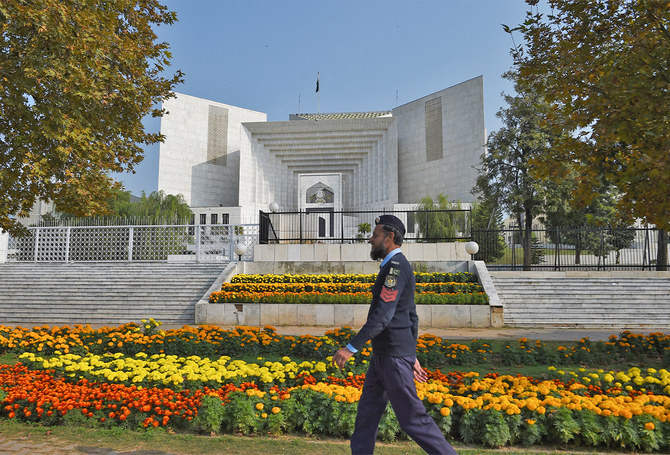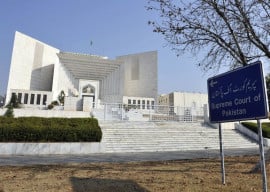
Although the Supreme Court majority opinion on the interpretation of Article-63 (A) is being appreciated to strengthen the parliamentary system in the country, critics are also raising voice over the vast interpretation of the Constitution that may ultimately encourage judges to rewrite it in accordance with their ideologies and wishes.
The majority of the lawyers are also not impressed with the reasoning to hold that the votes of defecting lawmakers should be discarded under Article-63 (A).
The majority opinion explains that the first pathway is internal – de-seating the defectors within the party and cleansing the system. The second pathway is external, which means the negative effect of the vote cast — to be able to cleanse it.
This second invisible pathway means to disregard the vote. Many lawyers fear that the interpretation, wherein the 'second pathway' is introduced, may encourage the judges to interpret the Constitution in accordance with their ideologies.
However, one section of the lawyers says that the Constitution is a living document and it is being interpreted in the same way all over the world.
The majority opinion, which is authored by Justice Munib Akhtar, has highlighted the rights of political parties under Article-17 (2) of the Constitution through the previous jurisprudence evolved by the apex court in the cases of former prime ministers Benazir Bhutto and Nawaz Sharif.
It held that Article-17 (2) and Article-63 (A) were intertwined. It also stated that Article-63 (A) should be read with Article-17 (2), which allows every citizen, not being in the service of Pakistan, to form or to become a member of a political party.
Also read: Defections delegitimise democracy: SC
The judgment explained how the defection was destructive for the political party as well as parliamentary democracy. A senior lawyer argued that Article-17 (2) started with “every citizen’s right” and not that of every party.
He said that the SC in previous judgments recognised political parties’ rights for the protection of citizens. He questioned whether or not the rights of a company or labour union would be given similar importance.
Interestingly, the majority judgment did not discuss that the original Constitution mentioned that the votes of lawmakers in a no-confidence motion against a prime minister would be discarded for 10 years. Later, no parliament gave it a permanent effect.
However, the SC by majority of one judge gave this effect by declaring that the votes would be discarded.
Two SC judges dissented with this view and their derailed opinions were released three months ago.
A lawyer said historically some judges have importance to the text of the Constitution.
But some believe that the Constitution was a living document, which could be interpreted in a manner to give the exact meaning of a provision.
Once senior lawyer Makhdoom Ali Khan in his article had rightly pointed out that the decisions in matters, which changed the shared understanding and ordinary meaning of the constitutional text, by select benches, whose size and composition was predicated on the will of the chief justice, further fuelled controversy.
Another lawyer Khurram Chughtae said the SC's interpretation of the Constitution with respect to Article-63 (A) primarily placed reliance on progressive, expansive, and expansion of the meaning of “life” in Shehla Zia (1994 SC) and “privacy” in Puttaswamy (2017 Indian SC), Benazir Bhutto (1988 SC) and Nawaz Sharif (1993 SC) that were only based on obsolete jurisprudential interpretation of political right.
However, he added that it had no relevance to Articles-55, -63 (A), and -95.
"Even if the Supreme Court rightly interpreted Article-63 (A), it is a very narrow interpretation to the extent that political stability was in favour of one party, not the democracy,” he noted.
“Apart from that, the SC totally ignored 28 different instances, which may attract Article-63 (A) without even disturbing the political strength of a single majority party in parliament in any manner. The minority view of two judges was published months back. The majority view could have more sound if the raison d'etre of the minority view could be addressed to a perfectly sound dicta,” Chughtae said.
Another legal expert Reema Omer in her tweet said the SC detailed judgment on Article-63 (A) was strikingly defensive; internally inconsistent; left important questions unaddressed; created more confusion and ambiguity; based on a very cynical view of politicians; and simultaneously, a very paternalistic view of courts’ role.
She also wrote that the court entirely dismissed the possibility of MPs voting against the party line because of their conscience in view of the country’s “constitutional and political history”
"The language makes it clear the court has little regard, let alone respect, for members of parliament,” she added.
Former Sindh High Court Bar Association chief Salahuddin Ahmed in his speech at the National Judicial Conference last month had also cautioned on the interpretation of Constitution by the SC regarding the scope of Article-63 (A).
“Of late, the jurisprudence of this Court has veered towards arrogating to itself the power to read words into the Constitution in order to effect what it perceives as the true will and intent of the constitution-makers. I refer to the Aam Log Party v Election Commission case and the Presidential Reference in relation to counting votes of defectors. This is a dangerous path, sir. There is a frightening passage in Henry VI where Shakespeare writes, ‘Burn all the records of the realm. My mouth shall be the parliament of England’,” Salahuddin had said in his speech.
However former additional attorney general Waqar Rana said in the prevailing political situation, the majority judgment would strengthen democracy in the country.
He added that the Constitution should not be interpreted in a narrow way as it was a living document, which needed to address the questions which might arise in the future.
Also read: CJP Bandial terms Article 62(1)(f) ‘draconian' constitutional provision
Another lawyer said if the lawmakers believed that the SC went beyond its intent, then they might again amend the Constitution by holding that the votes of defecting lawmakers would be counted under Article-63 (A). He added that if parliament would not become active, an outsider including the judiciary would occupy this space.
The Supreme Court Bar Association (SCBA) has already filed a review petition against the SC majority opinion. However, one judge Justice Mazhar Alam Miankhel has already retired.
A new judge will be included in the bench. This will be important in the prevailing situation wherein SC judges are divided on ideological lines. Presently, the majority opinion is alive by one vote.
It is not clear yet which judge will be included in the larger bench hearing the SCBA review petition.
However, a lawyer said the 95-page judgment was not written to overturn in a review jurisdiction.




1731655243-0/BeFunky-collage-(61)1731655243-0-165x106.webp)

1731666526-0/Express-Tribune-(9)1731666526-0-270x192.webp)
1731668520-0/Express-Tribune-(11)1731668520-0-270x192.webp)



1731656720-0/Copy-of-Untitled-(44)1731656720-0-270x192.webp)








COMMENTS (2)
Comments are moderated and generally will be posted if they are on-topic and not abusive.
For more information, please see our Comments FAQ